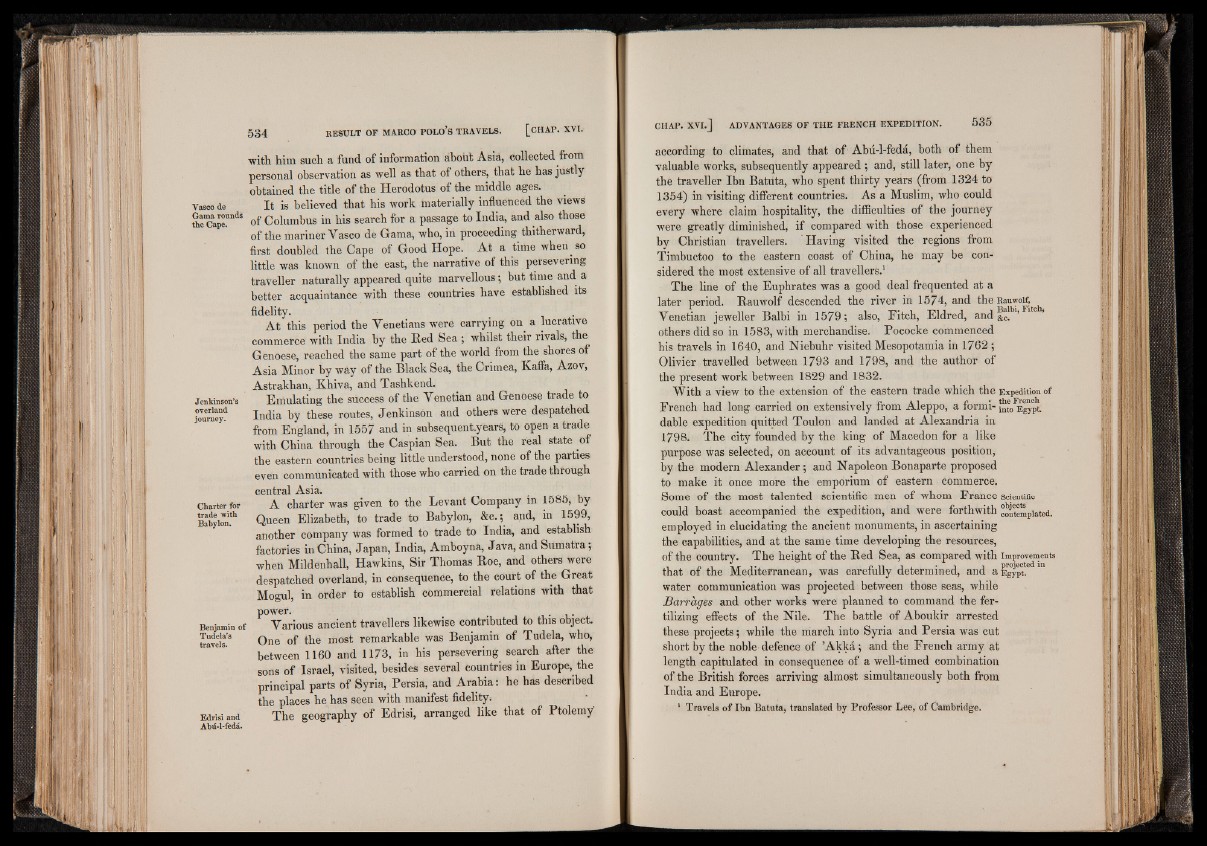
Vasco de
Gama rounds
the Cape.
Jenkinson’s
overland
journey.
Charter for
trade "with
Babylon.
Benjamin of
Tudela’s
travels.
Edrisi and
Abtí-1-fedá.
with him such a. fund of information about Asia, collected from
personal observation as well as that of others, that he has justly
obtained the title of the Herodotus of the middle ages.
It is believed tbat his work materially influenced the views
of Columbus in his search for a passage to India, and also those
of the mariner Vasco de Gama, who, in proceeding thitherward,
first doubled the Cape of Good Hope. At a time when so
little was known of the east, the narrative of this persevering
traveller naturally appeared quite marvellous; but time and a
better acquaintance with these countries have established its
fidelity.
At this period the Venetians were carrying on a lucrative
commerce with India by the Red Sea ; whilst their rivals, the
Genoese, reached the same part of the world from the shores of
Asia Minor by way of the Black Sea, the Crimea, Kaffa, Azov,
Astrakhan, Khiva, and Tashkend.
Emulating the success of the Venetian and Genoese trade to
India by tbese routes, Jenkinson and others were despatched
from England, in 1557 and in subsequent.years, to open a trade
with China through the Caspian Sea. But the real state of
the eastern countries being little understood, none of the parties
even communicated with those who carried on the trade through
central Asia.
A charter was given to the Levant Company in 1585, by
Queen Elizabeth, to trade to Babylon, &c.; and, in 1599,
another company was formed to trade to India, and establish
factories in China, Japan, India, Amboyna, Java, and Sumatra;
when Mildenhall, Hawkins, Sir Thomas Roe, and others were
despatched overland, in consequence, to the court of the Great
Mogul, in order to establish commercial relations with that
power.
Various ancient travellers likewise contributed to this object.
One of the most remarkable was Benjamin of Tudela, who,
between 1160 and 1173, in his persevering search after the
sons of Israel, visited, besides several countries in Europe, the
principal parts of Syria, Persia, and Arabia: he has described
the places he has seen with manifest fidelity*
The geography of Edrisi, arranged like that of Ptolemy
according to climates, and that of' Abu-l-feda, both of them
valuable works, subsequently appeared ; and, still later, one by
the traveller Ibn Batuta, who spent thirty years (from 1324 to
1354) in visiting different countries. As a Muslim, who could
every where claim hospitality, the difficulties of the journey
were greatly diminished, if compared with those experienced
by Christian travellers. Having visited the regions from
Timbuctoo to the eastern coast of China, he may be considered
the most extensive of all travellers.1
The line of the Euphrates was a good deal frequented at a
later period. Rauwolf descended the river in 1574, and the Rauwotf,^
Venetian jeweller Balbi in 1579; also, Fitch, Eldred, and &c. ’
others did so in 1583, with merchandise. Pococke commenced
his travels in 1640, and Niebuhr visited Mesopotamia in 1762;
Olivier travelled between 1793 and 1798, and the author of
the present work between 1829 and 1832.
With a view to the extension of the eastern trade which the Expedition of
French had long carried on extensively from Aleppo, a formi- *nte0 ¿gypt
dable expedition quitted Toulon and landed at Alexandria in
1798. The city founded by the king of Macedon for a like
purpose was selected, on account of its advantageous position,
by the modern Alexander; and Napoleon Bonaparte proposed
to make it once more the emporium of eastern commerce.
Some of the most talented scientific men of whom France scientific
could boast accompanied the expedition, and were forthwith contemplated,
employed in elucidating the ancient monuments, in ascertaining
the capabilities, and at the same time developing the resources,
of the country. The height of the Red Sea, as compared with improvements
that of the Mediterranean, was carefully determined, and a Egypt!64 ™
water communication was projected between those seas, while
Barrhges and other works were planned to command the fertilizing
effects of the Nile. The battle of Aboukir arrested
these projects; while the march into Syria and Persia was cut
short by the noble defence of ’Akka; and the French army at
length capitulated in consequence of a well-timed combination
of the British forces arriving almost simultaneously both from
India and Europe.
1 Travels of Ibn Batuta, translated by Professor Lee, of Cambridge.